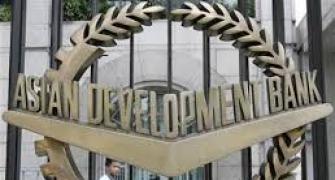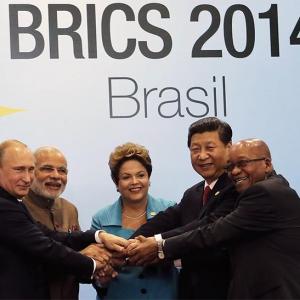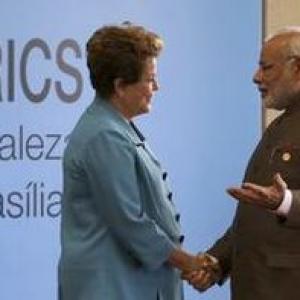The formidable intentions of AIIB and the new transnational corridors project are both a challenge and an opportunity for India, notes Akshay Mathur.
 The announcement by Britain, France, Germany, Australia and Brazil to join the China-promoted Asian Infrastructure Investment Bank (AIIB) has taken the world by surprise.
The announcement by Britain, France, Germany, Australia and Brazil to join the China-promoted Asian Infrastructure Investment Bank (AIIB) has taken the world by surprise.
AIIB, dismissed just months ago by western countries as another flamboyant plan by China, is now clearly accepted as a tangible game changer in the multilateral financial architecture.
What really reveals the scope and potential of AIIB, however, is Beijing's brilliant and calibrated March 29 vision for transnational economic corridors for Asia, inviting the world to participate in this ambitious web of cross-border physical, financial and business connectivity.
India, along with 45 other countries including Indonesia and Singapore, is a founder member of AIIB.
AIIB's voting structure may be based on purchasing power parity and gross domestic product (GDP). If that happens, India will become the second-largest shareholder, and must aim to influence these institutions.
China's intended role for AIIB is not so different from the existing Western lenders like the World Bank (WB) and the International Monetary Fund (IMF), which have configured the system to suit their needs. In AIIB, China has replicated the formation and functioning of these institutions.
In formation,
The IMF and WB were post-war efforts by the US to capitalise on a fiscally-weak Britain and extend control over the Sterling Area by internationalising trade rules (for example, reduction of tariffs) and foreign exchange rules (for example, no devaluation) while financing post-war economic growth.
AIIB is a post-recession effort by China to capitalise on a fiscally-weak US and European Union, to limit US economic influence in Asia by internationalising infrastructure development.
The AIIB focus on infrastructure is a masterstroke. Infrastructure is China's competency. The China Development Bank (CDB) already has 16 per cent committed abroad.
By some estimates, CDB and China's Exim Bank, together provide more aid to Asia than the WB and Asian Development Bank, combined. In 2014, G20 leaders pledged to advance global GDP by 2 per cent, using infrastructure as a key instrument.
As the US did, China wants to keep majority shareholding, so it can influence AIIB's course - an opportunity it did not get with the WB and IMF (both under 5 per cent) or the BRICS bank (equal 20 per cent). China is rumoured to be seeking a 50 per cent voting share of AIIB's initial capital of $50 billion.
China is leveraging legitimate concerns. Developing countries are frustrated with the Western institutions' unfair standards, ineffective aid policies and interference in local policy-making.
The pressure on South Korea and Indonesia to open their domestic economies to foreign investment, in return for financial assistance during the 1997 Asian crisis, has not been forgotten.
There's also China's strategic interest looking for multilateral legitimacy and funding. Global participation in China-led projects, it hopes, will dilute its reputation in parts of Africa and Asia of an abrasive and transactional foreign aid policy.
In functioning,
The vision for AIIB and China's infrastructure projects like the Maritime Silk Road, Silk Road Economic Belt, and Pakistan-China Economic Corridor, coincide. This is how the US uses IMF multilateral funding for projects in Ukraine, Iraq and Afghanistan.
The World Bank and IMF co-opted countries. China will go beyond, to co-opt long-term investors such as pension funds, sovereign wealth funds and insurance companies, which have $50 trillion in capital.
China will invest its own $3-trillion reserves in projects promising higher returns than US Treasury Bills. The US has done that successfully for decades by recycling petro dollars into developing countries.
AIIB will be a platform for renminbi internationalisation, just as the IMF and WB were for dollar internationalisation. It can then raise and extend loans in renminbi on a large scale, an experiment that CDB has already undertaken.
The formidable intentions of AIIB and the new transnational corridors project are both a challenge and an opportunity for India.
If AIIB takes equity stakes in transnational infrastructure projects, it has geopolitical implications. Islamabad awarding management control of its GwadarPort to China in 2013, created a stir in India and the West.
Imagine China's clout within India if AIIB owns or manages India-located projects such as the Bangladesh-China-Myanmar-India corridor, and the many internal industrial corridors that Prime Minister Narendra Modi has planned with foreign funding.
The opportunity for India then, is to influence and partner both AIIB and the nascent BRICS bank on favourable terms. Infrastructure is the focus of BRICS bank too, but so is sustainable development.
Developing countries, including India, can seek financing for climate change technologies, environment protection, affordable drugs and other technology-based public service delivery solutions.
This will leverage India's IT prowess and Brazil's sustainable development experience. The first president of the BRICS bank from India should set this course.
India is at a critical juncture. It is one of the largest recipients of WB aid, loans that can be cannibalised as these new institutions emerge, so it must capitalise on its early placement in the new multilateral financial architecture.
Else, as the experience with the United Nations Security Council, Association of Southeast Asian Nations, Asia-Pacific Economic Cooperation and Shanghai Cooperation Organisation shows, a missed opportunity in the beginning will take years to make up - if ever.
The author is the head of research and Geoeconomics Fellow at Gateway House: Indian Council on Global Relations, Mumbai.










